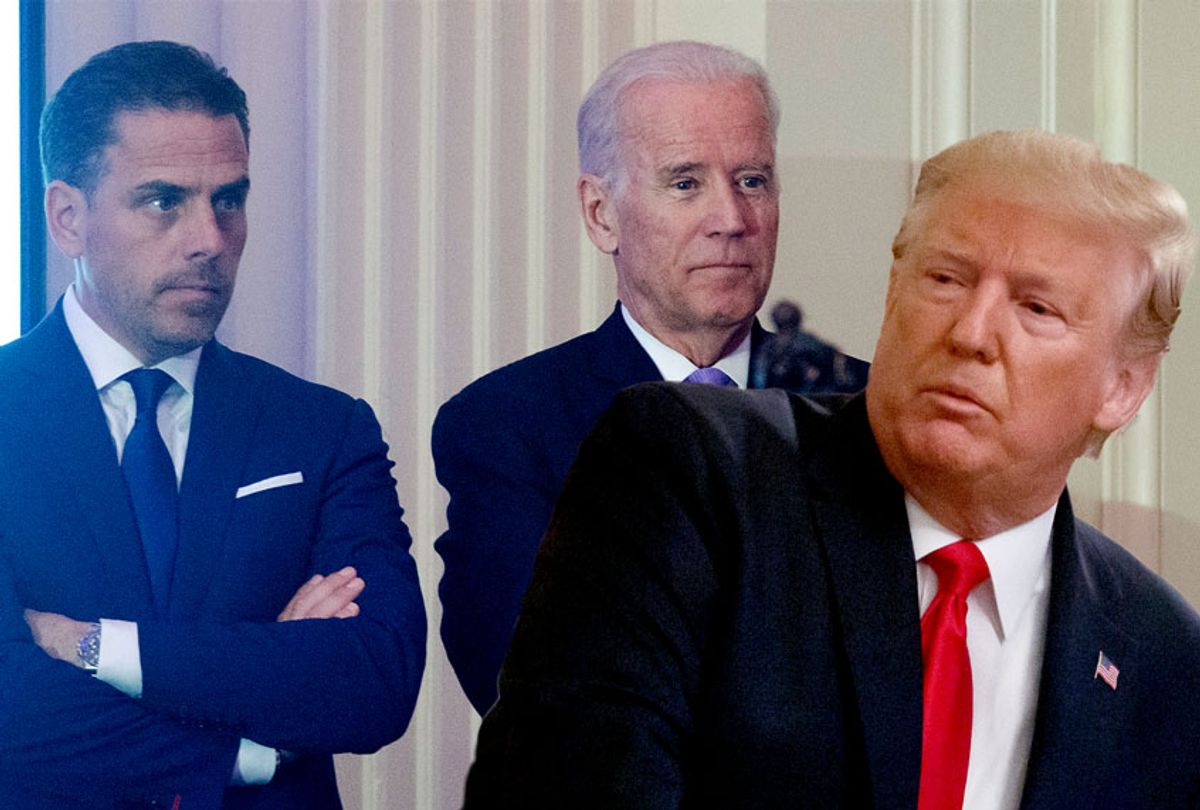The FBI is reportedly investigating whether emails published Wednesday by the New York Post in connection with widely discredited corruption allegations about Hunter Biden are part of a possible Russian effort to spread disinformation ahead of the presidential election.
NBC News first reported the existence of the investigation, followed by the Associated Press and CNN, which cite administration and congressional sources.
The alleged emails came to the Rupert Murdoch-owned tabloid through President Donald Trump's personal attorney, Rudy Giuliani, who claimed to have acquired a copy of a computer hard drive belonging to the son of Democratic presidential nominee Joe Biden. The authenticity of the emails has not been independently verified, and reporters pointed out major errors and holes in The Post story after it was published.
The Washington Post reported Thursday that U.S. officials repeatedly warned the White House in 2019 that Giuliani was a target of Russian intelligence — and any information he passed along might be tainted by his interactions with pro-Putin officials in Ukraine. Giuliani's meddling in Ukraine led directly to Trump's impeachment last year.
News outlets have repeatedly debunked allegations of corruption against the Bidens, and a roundly discredited investigation by Senate Republicans — predicated in part on information acquired by Giuliani from a Russian agent sanctioned by the Trump administration — found no evidence that the former vice president had engaged in wrongdoing related to his son's business dealings.
Reports of the FBI investigation echo headlines from the final weeks of the 2016 election cycle, when U.S. intelligence agencies began probing whether individuals connected to the Trump campaign were involved in Russian government efforts to harm Hillary Clinton via dumps of emails stolen from Democratic officials.
Burisma, the Ukrainian energy company at the center of the corruption allegations against the Bidens, appeared to have been hacked by the same Russian GRU intelligence unit that participated in the hacking of the Democratic National Committee in 2016, The New York Times reported in January. The hack occurred as Trump went on trial in the Senate for withholding aide to Ukraine in exchange for investigations into the Bidens, according to the outlet.
The Times newly reported on Thursday that U.S. intelligence analysts had contacted individuals familiar with the Burisma attack last month after intercepting "chatter" indicating that emails stolen from the company might be leaked as an October surprise designed to damage Biden's candidacy.
U.S. officials were specifically concerned that authentic Burisma material might be leaked alongside fake content, sources told the outlet. Such an occurrence would mirror the blend of real emails and forgeries dumped by Russia ahead of the 2017 elections in France, which were designed to make fact-checking difficult.
CNN on Friday reported that the new FBI probe was part of a broader investigation into Russian disinformation which pre-dates last fall's House impeachment inquiry. The alleged influence campaign aims to link the former vice president to his son's work with Burisma, according to the outlet.
The Biden campaign denied The New York Post report, which was concluded to be so dubious by Facebook and Twitter that both platforms limited users' ability to share links to the stories, moves which drew backlash from top Republicans. Twitter, pointing out that the reporting included personal phone numbers and email addresses and violated its policy on distributing hacked information, temporarily locked some accounts which pushed the story, including the official accounts of the Trump campaign and the White House press secretary.
Trump and his allies seized on The Post report to smear Biden on the campaign trail this week, but the corruption allegations appear to have had little impact over the past year: A Gallup poll published earlier this month found that voters view Biden as more honest than Trump by a 12-point margin.
The controversial report, which was published only three weeks before Election Day, drew from material obtained by two Trump allies: Giuliani and former White House and campaign strategist Steve Bannon, who is out on bail after being indicted in August on federal money laundering and obstruction charges. The outlet said it first learned about the emails from Bannon but acquired them through Giuliani.
Bannon, whom federal agents arrested three weeks ago aboard a yacht owned by Chinese billionaire fugitive Guo Wengui off of the Connecticut coastline, boasted in September to a Dutch media outlet that he was in possession of Hunter Biden's hard drive. The Daily Beast on Friday reported that a network run by Guo had simultaneously hyped incriminating hard drives obtained by Chinese officials. Bannon and Guo have appeared in recent photographs with Giuliani.
A few hours after publication, the Trump-backing computer repair store owner who claimed to have first come across the alleged emails recounted a number of conflicting stories to a group of journalists in what was described as a "bizarre" and meandering interview.
The store owner, who referenced the debunked anti-Clinton Seth Rich conspiracy theory, abruptly ended the interview after claiming he had contacted Giuliani as a "lifeguard."
"Ah sh*t," the owner said as he ended the interview.
Giuliani has since contradicted both the store owner and his own original chronicle of events.
"It's a garbage fire story with obscene numbers of legal holes and flaws," national security attorney Bradley Moss told Salon on Wednesday.
Moss pointed out that while the legal implications for Giuliani were unclear, the repair store owner may have exposed himself to civil and criminal liability under state and federal computer privacy laws.



Shares